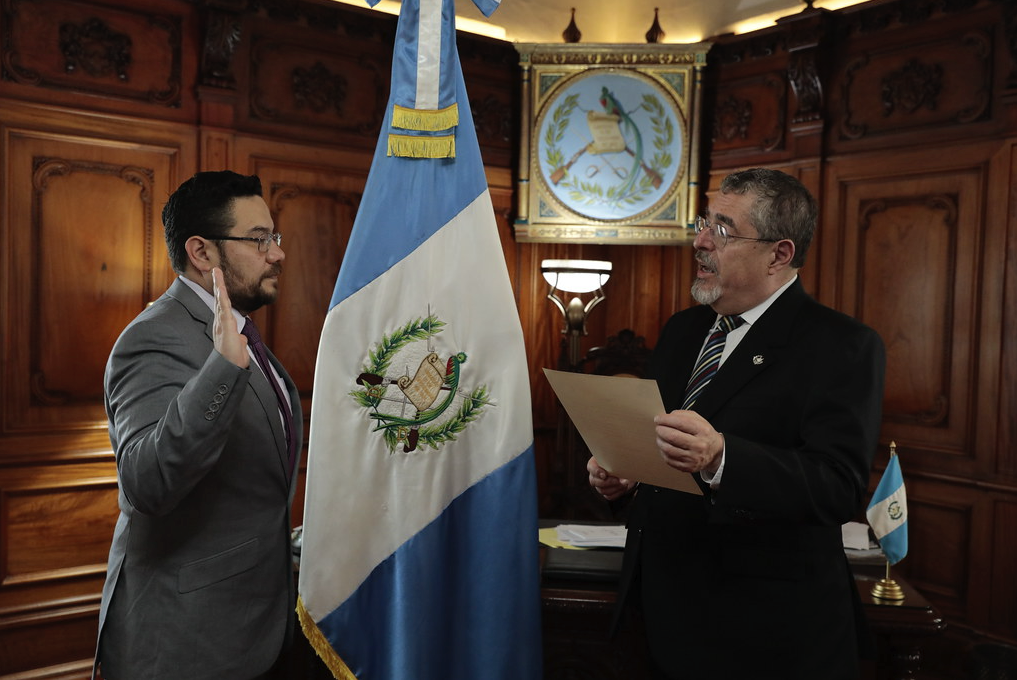Bernardo Arévalo and Karin Herrera took office on January 14 after surprisingly winning an election that had been altered in its origin. This happened when the Courts prevented the participation of three leading candidates after overcoming the long coup operation led against them by the outgoing government of Alejandro Giammattei and Consuelo Porras, the Attorney General. Giammattei and Porras, using the judicial institutions, tried for five months to prevent the legitimate winners from becoming president and vice-president of the country.
The alternation in power would not have been possible without the rebellion of the electorate, the determined and coordinated support of international organizations, as well as the resistance in defense of democracy led by the ancestral authorities and the indigenous peoples, which lasted for more than 100 days and extended to the popular neighborhoods on the outskirts of Guatemala City.
Thus, a government with strong international sympathy and broad popular support took office, which on April 23 completed 100 days of facing the resulting contradictions between managing institutions with authoritarian structures reluctant to its mandate and the clamor for strong measures from those who defended Guatemalan democracy. Taking this context into account, we will analyze 5 dimensions that allow us to understand these first 100 days of a government that faces the complex task of initiating the recovery of a country in ruins.
- International credibility
The recovery of Guatemala’s reputation in the world has been one of the most outstanding achievements of the government in these first 100 days. Although it has not been exempt from criticism for its close alignment with Western policy on controversial issues such as the relationship with Israel and Ukraine, this repositioning has allowed the government to be reliable in attracting foreign investment and to reach agreements that improve the country’s quality as a partner.
- Social trust
The government has conveyed consistency with the discourse of transparency and anti-corruption. It has quickly and convincingly self-policed itself in the face of allegations of ethical misconduct or potential acts of corruption. This has contributed to maintaining high public confidence in the government. However, this has been waning in the face of a growing public perception of a lack of decisiveness in dealing with the attorney general and officials of the last two governments who plundered resources, undermined institutions, and illegally prosecuted a hundred or so uncomfortable actors, from university professors to anti-corruption judges.
- The legitimate direction of public management
The government has had enormous difficulties in placing trustworthy officials compatible with its political project in the positions of the administration that are assumed by designation. In addition to the concessions that are normal when governing without a majority, the government has not been able to replace officials appointed by previous governments, either for fear of judicialization of administrative processes or for the financial problems they could cause to the institutions, due to the indemnities that the courts have established for those who have held politically appointed positions.
This is relevant because it contradicts both the harmonization and the execution capacity of the public administration. But also because it has been at the heart of what has been called the capture economy. In addition to this, disinformation campaigns have been launched to defame the government or to turn social advances invisible, such as the 13% reduction in assaults and homicides during the first quarter of 2024 compared to the same period in 2023.
- Political alliances
Although the alliances between the executive and the legislature have allowed the construction of the first line of the Metrorail in Guatemala City (executive) and to ensure the inauguration and approval of five laws of the official agenda (legislature), they are projected as the most unstable dimension of the government due to the questionable past of the legislature in its way of doing politics. This leads to differences in criteria among the main sectors of the ruling party on the convenience of maintaining them in the immediate future.
In fact, before the Holy Week, the deputies of the CABAL party paralyzed the legislative agenda in their eagerness to extend the agreements initially reached and were the architects of a couple of consecutive and significant defeats for the official bench. In addition, during the first weeks of April, the mayor, who received the support of the president to lead the National Association of Municipalities, has used it to politically oxygenate the Attorney General by inventing lines of cooperation between the Municipalities and the Public Ministry that did not exist before. This strengthens the Attorney General before the mayors being able to condition her positions in new aggressions against democracy and the will of the people. This happened when the social majority wanted her isolated (at least), due to the difficulties of removing her from office.
The truth is that both sectors visualize in their alliances some possibilities to fulfill their campaign promises and to guarantee governability to neutralize the political veto institutions that seek to isolate or remove the government from office. Both depend on the fulfillment of agreements and it is in these conditions of the political game where contradictions may become more acute.
- Political veto institutions
The Public Prosecutor’s Office, the Supreme Court of Justice, and the Constitutional Court have been the main impediments for the government to manage and achieve the objectives set, including the demands made and supported by civil society. Such an extent that it has maintained the suspension of the legal status of the governing party and has deliberately intervened in the legislative process where the official bench led the Board of Directors, which changed as a result of a controversial resolution of the Constitutional Control Court.
The direction the country may take lies in these institutions. In the Constitutional Court there is a consultation proposed by the General Secretariat in which the path for a possible dismissal of the Attorney General could be elucidated or blocked. In the coming months, judges and magistrates will be elected who will decide the legal future of the governing party and its main leaders, as well as the hundreds of political persecuted by the Public Prosecutor’s Office.
These movements will test the effectiveness and convenience of the alliances that the government has entered into, which are decisive for the success of the government and the future of democracy in Guatemala. This is in a context in which most of the countries that have faced autocratization processes have become autocracies despite the intermediate democratic episodes. Therein lies the capital importance for the binomial to count on its supporters, to reach consensus with the opponents, and, above all, to remain close to the people.
*Translated by Janaína Ruviaro da Silva from the original in Spanish.













